unit 2 heroes communication workshop 教案
文档属性
| 名称 | unit 2 heroes communication workshop 教案 |
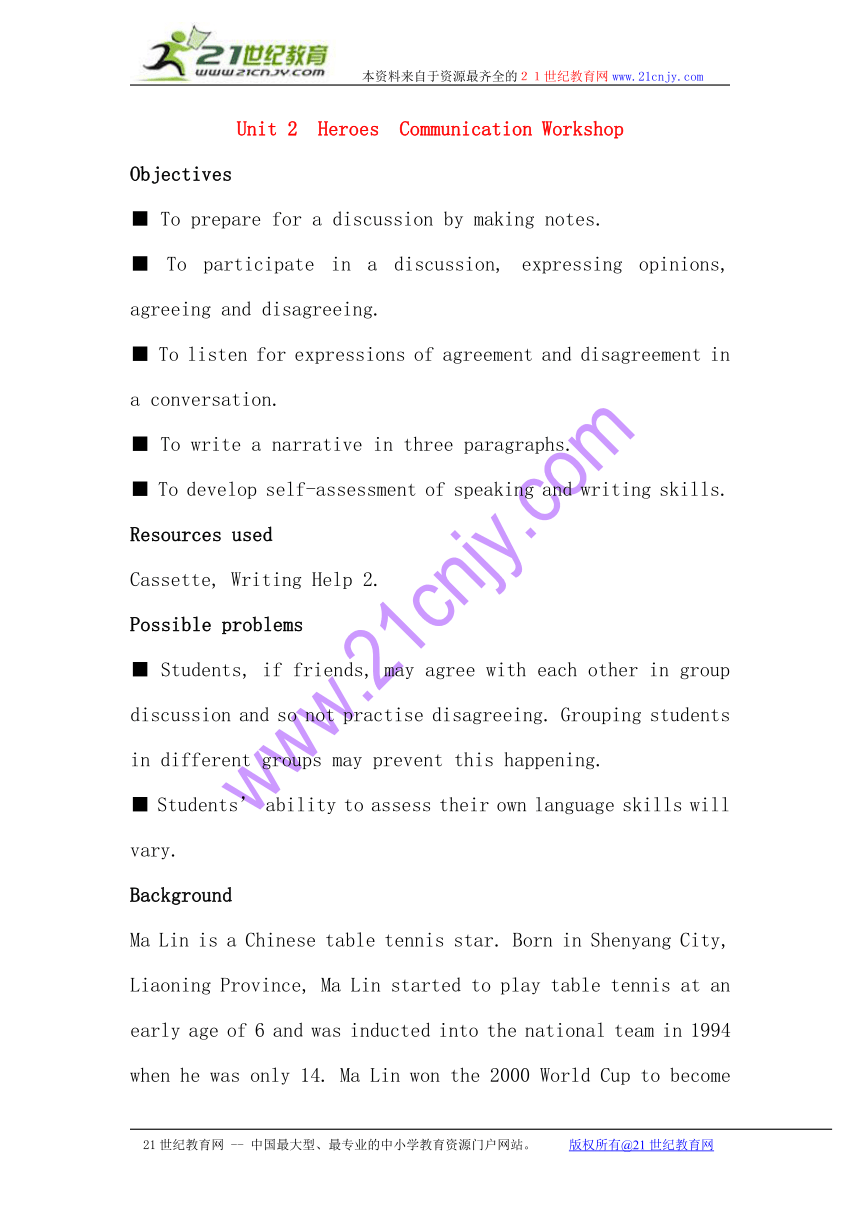
|
|
| 格式 | rar | ||
| 文件大小 | 15.6KB | ||
| 资源类型 | 教案 | ||
| 版本资源 | 北师大版 | ||
| 科目 | 英语 | ||
| 更新时间 | 2011-01-10 00:00:00 | ||
图片预览

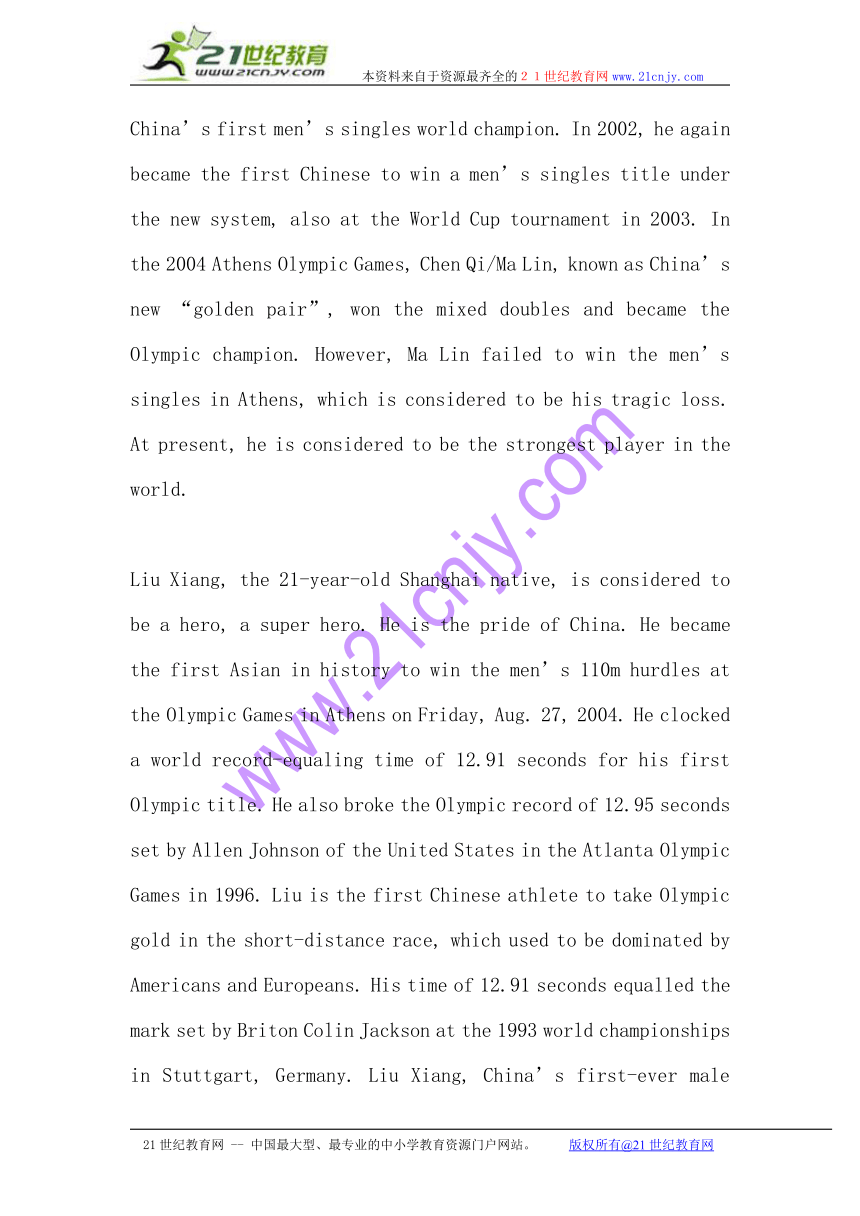
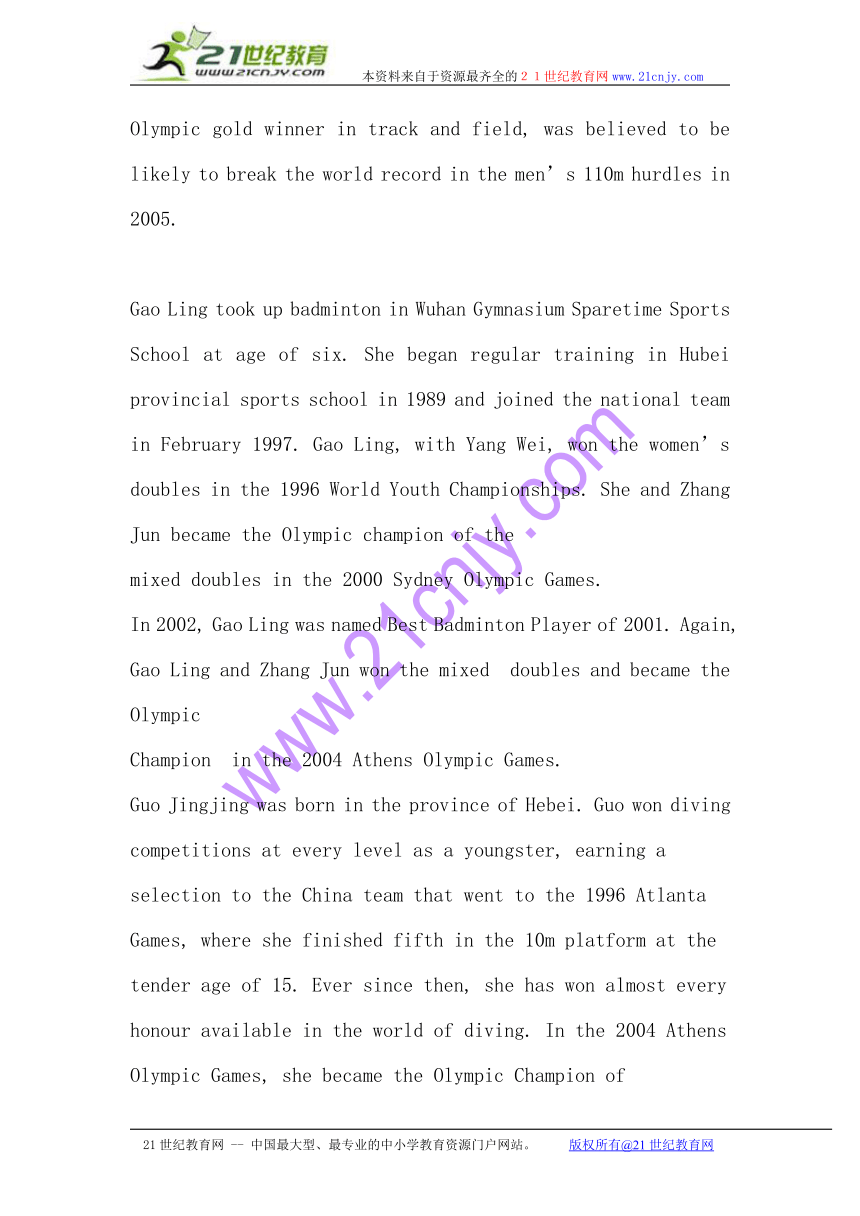
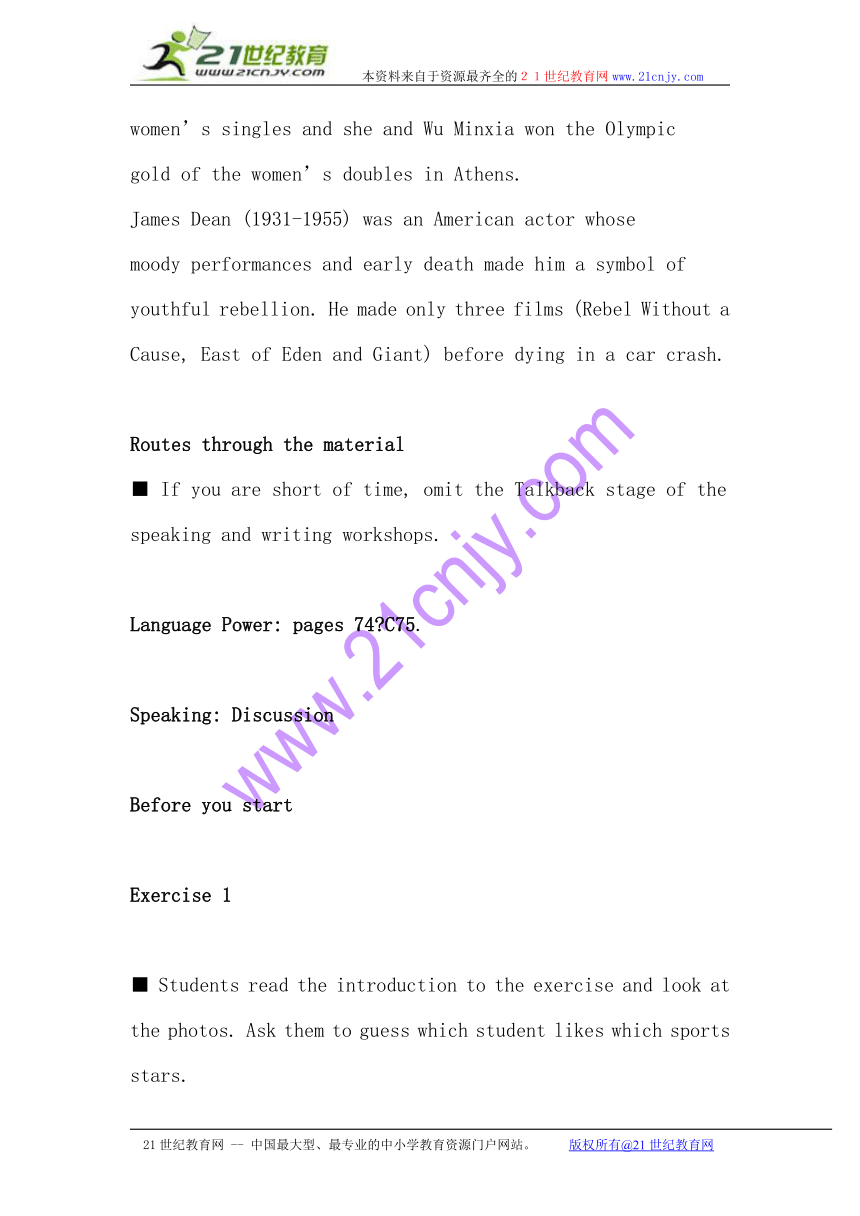
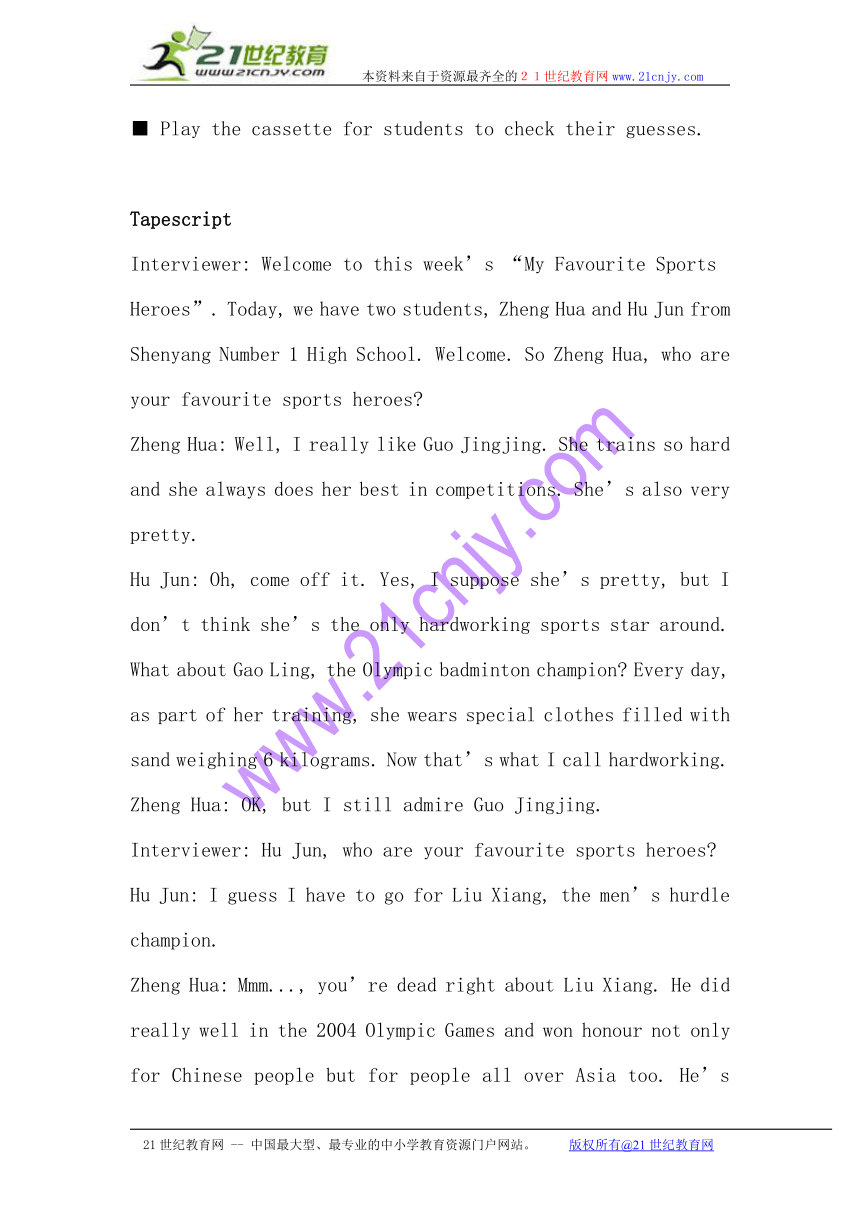
文档简介
本资料来自于资源最齐全的21世纪教育网www.21cnjy.com
Unit 2 Heroes Communication Workshop
Objectives
■ To prepare for a discussion by making notes.
■ To participate in a discussion, expressing opinions, agreeing and disagreeing.
■ To listen for expressions of agreement and disagreement in a conversation.
■ To write a narrative in three paragraphs.
■ To develop self-assessment of speaking and writing skills.
Resources used
Cassette, Writing Help 2.
Possible problems
■ Students, if friends, may agree with each other in group discussion and so not practise disagreeing. Grouping students in different groups may prevent this happening.
■ Students’ ability to assess their own language skills will vary.
Background
Ma Lin is a Chinese table tennis star. Born in Shenyang City, Liaoning Province, Ma Lin started to play table tennis at an early age of 6 and was inducted into the national team in 1994 when he was only 14. Ma Lin won the 2000 World Cup to become China’s first men’s singles world champion. In 2002, he again became the first Chinese to win a men’s singles title under the new system, also at the World Cup tournament in 2003. In the 2004 Athens Olympic Games, Chen Qi/Ma Lin, known as China’s new “golden pair”, won the mixed doubles and became the Olympic champion. However, Ma Lin failed to win the men’s singles in Athens, which is considered to be his tragic loss. At present, he is considered to be the strongest player in the world.
Liu Xiang, the 21-year-old Shanghai native, is considered to be a hero, a super hero. He is the pride of China. He became the first Asian in history to win the men’s 110m hurdles at the Olympic Games in Athens on Friday, Aug. 27, 2004. He clocked a world record-equaling time of 12.91 seconds for his first Olympic title. He also broke the Olympic record of 12.95 seconds set by Allen Johnson of the United States in the Atlanta Olympic Games in 1996. Liu is the first Chinese athlete to take Olympic gold in the short-distance race, which used to be dominated by Americans and Europeans. His time of 12.91 seconds equalled the mark set by Briton Colin Jackson at the 1993 world championships in Stuttgart, Germany. Liu Xiang, China’s first-ever male Olympic gold winner in track and field, was believed to be likely to break the world record in the men’s 110m hurdles in 2005.
Gao Ling took up badminton in Wuhan Gymnasium Sparetime Sports School at age of six. She began regular training in Hubei provincial sports school in 1989 and joined the national team in February 1997. Gao Ling, with Yang Wei, won the women’s doubles in the 1996 World Youth Championships. She and Zhang Jun became the Olympic champion of the
mixed doubles in the 2000 Sydney Olympic Games.
In 2002, Gao Ling was named Best Badminton Player of 2001. Again, Gao Ling and Zhang Jun won the mixed doubles and became the Olympic
Champion in the 2004 Athens Olympic Games.
Guo Jingjing was born in the province of Hebei. Guo won diving competitions at every level as a youngster, earning a
selection to the China team that went to the 1996 Atlanta
Games, where she finished fifth in the 10m platform at the
tender age of 15. Ever since then, she has won almost every
honour available in the world of diving. In the 2004 Athens
Olympic Games, she became the Olympic Champion of
women’s singles and she and Wu Minxia won the Olympic
gold of the women’s doubles in Athens.
James Dean (1931-1955) was an American actor whose
moody performances and early death made him a symbol of
youthful rebellion. He made only three films (Rebel Without a Cause, East of Eden and Giant) before dying in a car crash.
Routes through the material
■ If you are short of time, omit the Talkback stage of the
speaking and writing workshops.
Language Power: pages 74 C75.
Speaking: Discussion
Before you start
Exercise 1
■ Students read the introduction to the exercise and look at the photos. Ask them to guess which student likes which sports stars.
■ Play the cassette for students to check their guesses.
Tapescript
Interviewer: Welcome to this week’s “My Favourite Sports
Heroes”. Today, we have two students, Zheng Hua and Hu Jun from Shenyang Number 1 High School. Welcome. So Zheng Hua, who are your favourite sports heroes
Zheng Hua: Well, I really like Guo Jingjing. She trains so hard and she always does her best in competitions. She’s also very pretty.
Hu Jun: Oh, come off it. Yes, I suppose she’s pretty, but I don’t think she’s the only hardworking sports star around. What about Gao Ling, the Olympic badminton champion Every day, as part of her training, she wears special clothes filled with sand weighing 6 kilograms. Now that’s what I call hardworking.
Zheng Hua: OK, but I still admire Guo Jingjing.
Interviewer: Hu Jun, who are your favourite sports heroes
Hu Jun: I guess I have to go for Liu Xiang, the men’s hurdle champion.
Zheng Hua: Mmm..., you’re dead right about Liu Xiang. He did really well in the 2004 Olympic Games and won honour not only for Chinese people but for people all over Asia too. He’s great!
Hu Jun: Absolutely!
Zheng Hua: But there are lots of other great sports stars like him. For example, er..., Ma Lin, the table tennis champion. In the 2004 Olympics, he won the gold medal.
Hu Jun: That’s true. You’ve got a point there.
Answers
Hu Jun C C C Gao Ling Zheng Hua C C C Guo Jingjing
Both C C C Liu Xiang, Ma Lin
Exercise 2
■ Students read the expressions in the Function File and predict which show strong agreement, limited agreement or disagreement.
■ Play the cassette so that students can hear the stress and intonation in the voices and mark the expressions (++), (+), (-).
Answers
(++) You’re dead right. Absolutely. That’s true.
(+) OK, but ... You’ve got a point there. I suppose ... but ...
(-) Oh, come off it.
■ Play the cassette again, pausing after each expression so that students can repeat it with appropriate stress and intonation.
Stage 1
■ Each student chooses a hero or heroine from films, music or sport to talk about. Students can work in pairs, if you prefer.
■ Read the Strategies with the students. Ask them if they follow similar procedures when they have discussions in other school subjects.
■ Give students time to make notes and to practise expressions for giving opinions, agreeing and disagreeing.
Stage 2
■ Students work in groups of three or four, discussing their heroes/heroines. Each group might like to appoint a secretary to note down their agreements and report back to the class in the next stage. As the groups are working, go round and monitor their language but don’t interrupt the discussion. Any general mistakes can be brought to their attention at the end of the discussion and remedial practice given, if necessary.
Stage 3
■ The groups report back to the class on their agreements (and disagreements, if you wish).
Talkback
■ Students answer the questions about their own performance in the speaking activity.
■ Have an open discussion about the mistakes students remember they made and use this opportunity to draw their attention to any common mistakes you noticed.
Listening
Exercise 1
■ Students discuss what they know of James Dean, his life and his films.
Exercise 2
■ Students read the lyrics and predict where the missing words might fit.
■ Students listen to the song, complete the lyrics and see if their predictions were correct.
Answers
1. mean 2. clean 3. screen 4. was 5. cause
6. fast 7. young
Tapescript
James Dean, James Dean,
I know just what you mean.
James Dean, you said it all so clean.
And I know my life would look all right
If I could see it on the silver screen.
You were the lowdown rebel if there ever was
Even if you had no cause.
James Dean, you said it all so clean.
And I know my life would look all right
If I could see it on the silver screen.
We’ll talk about a low-down bad refrigerator,
You were just too cool for school,
Sock hop, soda pop, basketball and auto shop,
The only thing that got you off was breakin’ all the rules.
James Dean, James Dean,
So hungry and so lean.
James Dean, you said it all so clean.
And I know my life would look all right
If I could see it on the silver screen.
Little James Dean, up on the screen
Wond’rin’ who he might be,
Along came a Spyder and picked up a rider
And took him down the road to eternity.
James Dean, James Dean, you bought it sight unseen.
You were too fast to live, too young to die, bye-bye.
You were too fast to live, too young to die, bye-bye.
Bye-bye, Bye-bye, Bye-bye, Bye, bye.
Exercise 3
■ Students discuss which of the feelings the singer has towards James Dean. Ask them to refer back to the words in the song to support their point of view.
Answers
Students can probably find support for both b) and c) but not a).
Writing: A Story
Before you start
■ Students read the story on page 90 and match the paragraphs with the story sections. Explain that section b) will have more than one paragraph.
■ Remind students of the linking words that establish a time
sequence and elicit examples from the article on page 90.
Stage 1
■ Students can work in pairs or individually.
■ Students may like to write brief notes at this stage to act as prompts when they are writing their stories. Remind students that they should think of a story of bravery.
Stage 2
■ Explain the meaning of the timeline and show students the temporal order of events in the example. You may wish to revise what linking word can be used before the description of each event. Encourage students to think of new linking words.
Answers
b) paragraphs 2 C5 c) paragraph 6.
Stage 3
■ Students should refer to Writing Help 2 before writing their paragraphs. You may wish to spend some time in class looking at the Writing Help with the students and then have them write their stories as homework.
Stage 4
■ Refer students to Writing Help 2 for the assessment criteria.
Talkback
In groups, students read each other’s stories and decide which one describes the bravest actions. Monitor the activity and make sure nobody gets embarrassed. One student per group reports to the rest of the class. Do not interrupt the reports to correct mistakes, but rather wait until the end.
21世纪教育网 -- 中国最大型、最专业的中小学教育资源门户网站。 版权所有@21世纪教育网
Unit 2 Heroes Communication Workshop
Objectives
■ To prepare for a discussion by making notes.
■ To participate in a discussion, expressing opinions, agreeing and disagreeing.
■ To listen for expressions of agreement and disagreement in a conversation.
■ To write a narrative in three paragraphs.
■ To develop self-assessment of speaking and writing skills.
Resources used
Cassette, Writing Help 2.
Possible problems
■ Students, if friends, may agree with each other in group discussion and so not practise disagreeing. Grouping students in different groups may prevent this happening.
■ Students’ ability to assess their own language skills will vary.
Background
Ma Lin is a Chinese table tennis star. Born in Shenyang City, Liaoning Province, Ma Lin started to play table tennis at an early age of 6 and was inducted into the national team in 1994 when he was only 14. Ma Lin won the 2000 World Cup to become China’s first men’s singles world champion. In 2002, he again became the first Chinese to win a men’s singles title under the new system, also at the World Cup tournament in 2003. In the 2004 Athens Olympic Games, Chen Qi/Ma Lin, known as China’s new “golden pair”, won the mixed doubles and became the Olympic champion. However, Ma Lin failed to win the men’s singles in Athens, which is considered to be his tragic loss. At present, he is considered to be the strongest player in the world.
Liu Xiang, the 21-year-old Shanghai native, is considered to be a hero, a super hero. He is the pride of China. He became the first Asian in history to win the men’s 110m hurdles at the Olympic Games in Athens on Friday, Aug. 27, 2004. He clocked a world record-equaling time of 12.91 seconds for his first Olympic title. He also broke the Olympic record of 12.95 seconds set by Allen Johnson of the United States in the Atlanta Olympic Games in 1996. Liu is the first Chinese athlete to take Olympic gold in the short-distance race, which used to be dominated by Americans and Europeans. His time of 12.91 seconds equalled the mark set by Briton Colin Jackson at the 1993 world championships in Stuttgart, Germany. Liu Xiang, China’s first-ever male Olympic gold winner in track and field, was believed to be likely to break the world record in the men’s 110m hurdles in 2005.
Gao Ling took up badminton in Wuhan Gymnasium Sparetime Sports School at age of six. She began regular training in Hubei provincial sports school in 1989 and joined the national team in February 1997. Gao Ling, with Yang Wei, won the women’s doubles in the 1996 World Youth Championships. She and Zhang Jun became the Olympic champion of the
mixed doubles in the 2000 Sydney Olympic Games.
In 2002, Gao Ling was named Best Badminton Player of 2001. Again, Gao Ling and Zhang Jun won the mixed doubles and became the Olympic
Champion in the 2004 Athens Olympic Games.
Guo Jingjing was born in the province of Hebei. Guo won diving competitions at every level as a youngster, earning a
selection to the China team that went to the 1996 Atlanta
Games, where she finished fifth in the 10m platform at the
tender age of 15. Ever since then, she has won almost every
honour available in the world of diving. In the 2004 Athens
Olympic Games, she became the Olympic Champion of
women’s singles and she and Wu Minxia won the Olympic
gold of the women’s doubles in Athens.
James Dean (1931-1955) was an American actor whose
moody performances and early death made him a symbol of
youthful rebellion. He made only three films (Rebel Without a Cause, East of Eden and Giant) before dying in a car crash.
Routes through the material
■ If you are short of time, omit the Talkback stage of the
speaking and writing workshops.
Language Power: pages 74 C75.
Speaking: Discussion
Before you start
Exercise 1
■ Students read the introduction to the exercise and look at the photos. Ask them to guess which student likes which sports stars.
■ Play the cassette for students to check their guesses.
Tapescript
Interviewer: Welcome to this week’s “My Favourite Sports
Heroes”. Today, we have two students, Zheng Hua and Hu Jun from Shenyang Number 1 High School. Welcome. So Zheng Hua, who are your favourite sports heroes
Zheng Hua: Well, I really like Guo Jingjing. She trains so hard and she always does her best in competitions. She’s also very pretty.
Hu Jun: Oh, come off it. Yes, I suppose she’s pretty, but I don’t think she’s the only hardworking sports star around. What about Gao Ling, the Olympic badminton champion Every day, as part of her training, she wears special clothes filled with sand weighing 6 kilograms. Now that’s what I call hardworking.
Zheng Hua: OK, but I still admire Guo Jingjing.
Interviewer: Hu Jun, who are your favourite sports heroes
Hu Jun: I guess I have to go for Liu Xiang, the men’s hurdle champion.
Zheng Hua: Mmm..., you’re dead right about Liu Xiang. He did really well in the 2004 Olympic Games and won honour not only for Chinese people but for people all over Asia too. He’s great!
Hu Jun: Absolutely!
Zheng Hua: But there are lots of other great sports stars like him. For example, er..., Ma Lin, the table tennis champion. In the 2004 Olympics, he won the gold medal.
Hu Jun: That’s true. You’ve got a point there.
Answers
Hu Jun C C C Gao Ling Zheng Hua C C C Guo Jingjing
Both C C C Liu Xiang, Ma Lin
Exercise 2
■ Students read the expressions in the Function File and predict which show strong agreement, limited agreement or disagreement.
■ Play the cassette so that students can hear the stress and intonation in the voices and mark the expressions (++), (+), (-).
Answers
(++) You’re dead right. Absolutely. That’s true.
(+) OK, but ... You’ve got a point there. I suppose ... but ...
(-) Oh, come off it.
■ Play the cassette again, pausing after each expression so that students can repeat it with appropriate stress and intonation.
Stage 1
■ Each student chooses a hero or heroine from films, music or sport to talk about. Students can work in pairs, if you prefer.
■ Read the Strategies with the students. Ask them if they follow similar procedures when they have discussions in other school subjects.
■ Give students time to make notes and to practise expressions for giving opinions, agreeing and disagreeing.
Stage 2
■ Students work in groups of three or four, discussing their heroes/heroines. Each group might like to appoint a secretary to note down their agreements and report back to the class in the next stage. As the groups are working, go round and monitor their language but don’t interrupt the discussion. Any general mistakes can be brought to their attention at the end of the discussion and remedial practice given, if necessary.
Stage 3
■ The groups report back to the class on their agreements (and disagreements, if you wish).
Talkback
■ Students answer the questions about their own performance in the speaking activity.
■ Have an open discussion about the mistakes students remember they made and use this opportunity to draw their attention to any common mistakes you noticed.
Listening
Exercise 1
■ Students discuss what they know of James Dean, his life and his films.
Exercise 2
■ Students read the lyrics and predict where the missing words might fit.
■ Students listen to the song, complete the lyrics and see if their predictions were correct.
Answers
1. mean 2. clean 3. screen 4. was 5. cause
6. fast 7. young
Tapescript
James Dean, James Dean,
I know just what you mean.
James Dean, you said it all so clean.
And I know my life would look all right
If I could see it on the silver screen.
You were the lowdown rebel if there ever was
Even if you had no cause.
James Dean, you said it all so clean.
And I know my life would look all right
If I could see it on the silver screen.
We’ll talk about a low-down bad refrigerator,
You were just too cool for school,
Sock hop, soda pop, basketball and auto shop,
The only thing that got you off was breakin’ all the rules.
James Dean, James Dean,
So hungry and so lean.
James Dean, you said it all so clean.
And I know my life would look all right
If I could see it on the silver screen.
Little James Dean, up on the screen
Wond’rin’ who he might be,
Along came a Spyder and picked up a rider
And took him down the road to eternity.
James Dean, James Dean, you bought it sight unseen.
You were too fast to live, too young to die, bye-bye.
You were too fast to live, too young to die, bye-bye.
Bye-bye, Bye-bye, Bye-bye, Bye, bye.
Exercise 3
■ Students discuss which of the feelings the singer has towards James Dean. Ask them to refer back to the words in the song to support their point of view.
Answers
Students can probably find support for both b) and c) but not a).
Writing: A Story
Before you start
■ Students read the story on page 90 and match the paragraphs with the story sections. Explain that section b) will have more than one paragraph.
■ Remind students of the linking words that establish a time
sequence and elicit examples from the article on page 90.
Stage 1
■ Students can work in pairs or individually.
■ Students may like to write brief notes at this stage to act as prompts when they are writing their stories. Remind students that they should think of a story of bravery.
Stage 2
■ Explain the meaning of the timeline and show students the temporal order of events in the example. You may wish to revise what linking word can be used before the description of each event. Encourage students to think of new linking words.
Answers
b) paragraphs 2 C5 c) paragraph 6.
Stage 3
■ Students should refer to Writing Help 2 before writing their paragraphs. You may wish to spend some time in class looking at the Writing Help with the students and then have them write their stories as homework.
Stage 4
■ Refer students to Writing Help 2 for the assessment criteria.
Talkback
In groups, students read each other’s stories and decide which one describes the bravest actions. Monitor the activity and make sure nobody gets embarrassed. One student per group reports to the rest of the class. Do not interrupt the reports to correct mistakes, but rather wait until the end.
21世纪教育网 -- 中国最大型、最专业的中小学教育资源门户网站。 版权所有@21世纪教育网
